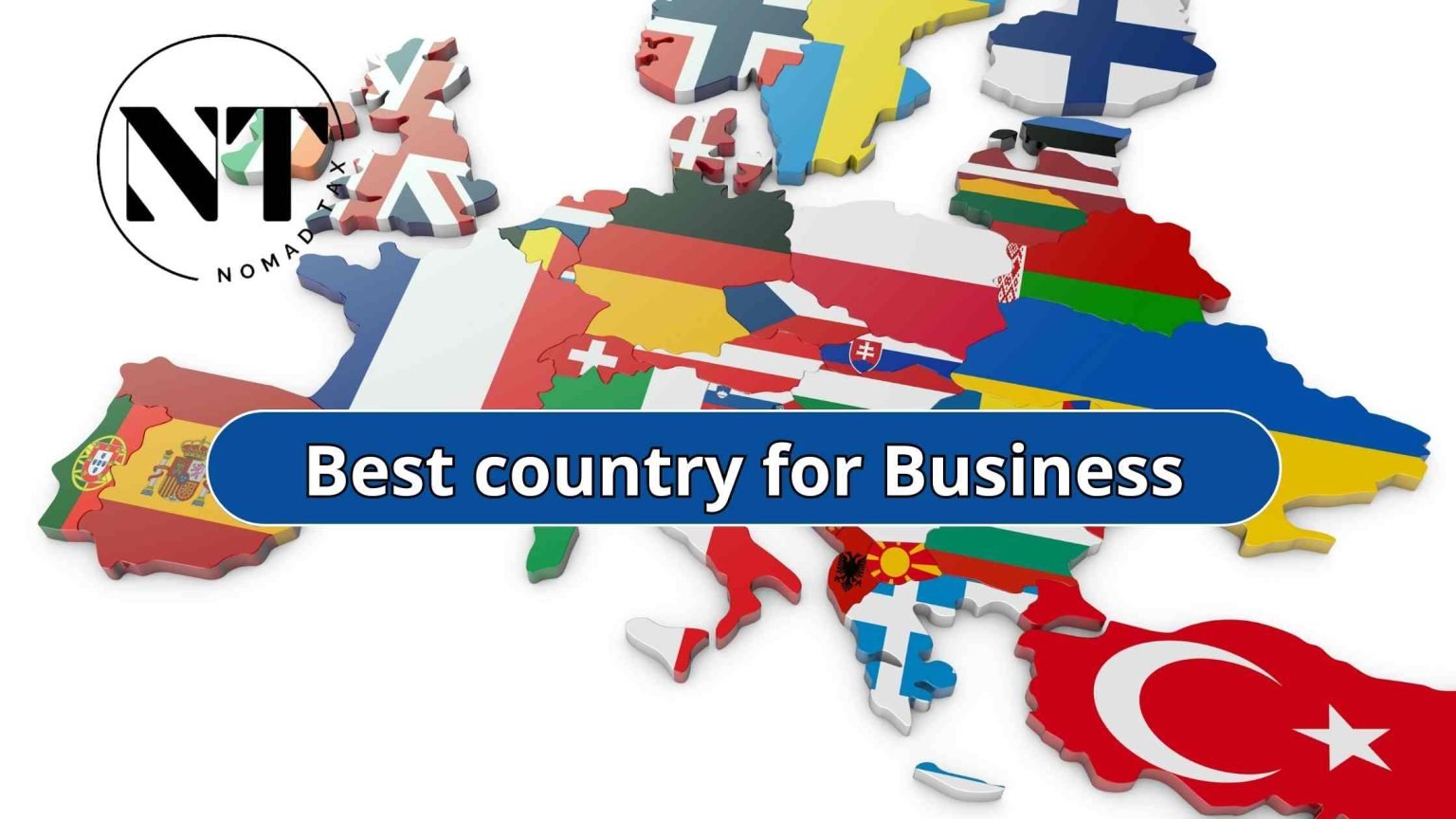Welcome back to our Blog, where we provide updated information from a practical standpoint on how to structure your business to optimize taxes legally, as well as which country to live in based on your field of activity.
Today, we will delve into the topic from both a fiscal efficiency and a business environment perspective. In some jurisdictions, entrepreneurs tend to focus solely on the tax rate, they like it, open a company, and then face difficulties. Today, we will show you the best countries for doing business.
But before we proceed, let us mention that if you wish to discuss your personal situation, you can always schedule a call with us, and we will closely analyze which country would be the best fit for your business.
Indice del artículo
Entrepreneurship?
Entrepreneurship is a brave adventure that involves creating and developing a business from scratch. It is a path full of challenges and opportunities, requiring passion, dedication, and a strategic approach. However, one of the most crucial aspects for the success of an entrepreneurial venture is the location where it is established. Choosing the right country can make all the difference between success and failure.

Factors to Consider when Choosing the Best Countries for doing Business
Before making a decision, it is essential to assess certain factors that can influence the viability and growth of a business. Among them are:
- Political and Economic Stability: A country with a stable political and economic environment provides greater security and confidence to entrepreneurs.
- Ease of Starting a Business: Bureaucracy and procedures for setting up a business can vary significantly between countries. Opting for a place with a streamlined and straightforward process will facilitate the start of the entrepreneurial activity.
- Cost of Living and Labor: The cost of living affects both entrepreneurs and their employees. Choosing a country with reasonable living costs and a skilled workforce can be advantageous.
- Access to Markets and Customers: Proximity to potential markets and the existence of an adequate customer base are crucial considerations for business expansion and growth.
- Entrepreneur-Friendly Government Policies: Some countries offer tax incentives, grants, and specific support programs to promote entrepreneurship.

Europe: A Continent of Opportunities
Currently, all European countries are obligated to comply with regulations, have substance in the country. If we talk about Common Reporting Standard (CRS) requirements, automatic exchange of information, then all EU countries have adopted this regulation. But there are different requirements regarding a bank account in the incorporation countries; some jurisdictions require it, in others, it is an option, but definitely not obligatory. Therefore, the company can easily open an account at a neobank and start operating.
What also differs is the time to register a company. In some jurisdictions, the registration process will take one day, and in others, in practice, it may take several weeks.
It is impossible to cover the entire world in a single blog, so in this blog, I would prefer to analyze the most popular European jurisdictions such as Estonia, Cyprus, the UK, and Malta, and make a comparison between these countries. One of the popular countries is also Germany. It is very good at attracting investments, one of the best in Europe, but it does not have low corporate taxation. Therefore, I will not focus too much on it.
It also depends on how you want to obtain investments, from whom? If it is from government funds, you definitely need to establish a company in the country from which you want to obtain funding. However, if you are looking for private investments, from any company or venture capital fund, then it definitely does not matter which country you are registered in. So if it comes to private investments, it is very likely that you are not interested in Germany at all.
The aspects I want to focus on to compare which country might be the most interesting are taxes, of course, and the business environment.
By business environment, I mean not only local laws and regulations but also how easy it is to obtain funding, investments, hire employees, and open a bank account.
The lowest corporate tax rate is in Estonia. As low as 0%. However, if you are interested not only in having a nominal company but in hiring personnel, it is no longer the best country. Since payroll taxes are quite high. You will pay around 55% of taxes. In case you are not interested in having employees there, it means you will have difficulties with opening a bank account.
No bank in Estonia will open an account there for you. So what you might want to do in this case is to start operating with a neobank, then go to the bank in another jurisdiction where your business partners already have accounts and try to convince them that you need an account in their bank, in this country, to operate more easily.
The benefits of having a company in Estonia are definitely the registration and maintenance costs.
Everything is quite cheap there. Besides, for the founder of the company, it is quite easy to obtain a residence permit. If you do not need investments, if you do not want to hire personnel there, then you can also consider Estonia. I am not saying you should never use Estonia. It depends on each particular case.
Cyprus also has a low corporate tax rate.
The standard one is 12.5%, but if the company can benefit from the IP box regime, that’s why many IT companies are registered here, it will pay taxes at an effective rate of only 2.5%. This rate is one of the lowest in Europe. But in combination with the Non-Dom regime, it becomes even more attractive for business owners.
You pay 2.5% on the company’s income, distribute the dividends, and then pay another 2.65% tax on the dividends, and that’s it. The lowest possible taxes. The other benefit of having a company in Cyprus is that you do not need to open a bank account in Cyprus; you can open it in any other jurisdiction. But if you are interested in opening a bank account here, let us know in the comments, maybe we will make another video telling you where to open an account and what you need for that.
The UK has an incredible business structure called LLP
There, you have a corporate tax rate only at the partner level. We have made a previous blog about this, so you can watch it for more details here. But to summarize, the company pays 0% taxes at the company level if the income is generated abroad, not in the UK, and then taxation of the income will be done in different jurisdictions, where the partners live, as personal income tax.
The negative thing about having a company there is that if you want to bring employees from another country, it can be difficult. In the European Union, it will be easier. Also, if you need employees, due to the overall costs of living, wage rates in the UK will be higher than in Estonia and Cyprus as well. The UK is the most expensive jurisdiction on the list I mentioned earlier.
But, the UK is an excellent location if you need to attract investments.
It has many accelerators, centers, multiple conferences where you can find money to develop your business. If you are not scared off by the maintenance costs of the company, then the UK still might be of interest to you.
The next country is Malta.
This country is most interesting for companies working with cryptocurrencies due to its regulations. The corporate tax rate is quite high, but it is possible to achieve an effective tax rate of 5%. However, the maintenance costs of the company are definitely higher than in Cyprus or Estonia. And the whole process to achieve this 5% effective taxation is not simple.
Why are so many companies registered there? Historically, Malta was one of the first European countries to allow operations with cryptocurrencies. So many startups did not have other options where to register. Now, of course, most countries also regulate cryptocurrencies, but if you have already designed the entire structure to be taxed at 5%, then not many companies wanted to redomicile to other jurisdictions.
CONCLUSION
There you have it, our summary of the best countries in Europe to do business. Whether you are looking for a tax-friendly environment, access to the European market, or a thriving startup ecosystem, these countries offer attractive opportunities to grow and expand your business.
Remember to conduct thorough research and consult with professionals before making decisions.
Frequently Asked Questions
- What is the most recommended country to start a business?
- There is no one-size-fits-all answer as it depends on the type of business and specific entrepreneurial goals. Each country has unique advantages that can benefit certain types of ventures.
- How can I research the market in a foreign country?
- Market research involves analyzing competition, product or service demand, trade regulations, and local culture. You can use market studies and consult with local experts to gather relevant information.
- Is it difficult to obtain an entrepreneur visa in another country?
- The visa application process varies depending on the country and can be complex. Some countries have specific entrepreneur visa programs, while others may require demonstrating a significant investment and a solid business plan.
- Which is the best country to start a business with a limited budget?
- Countries with low living costs and startup support programs can be attractive options for entrepreneurs with limited budgets.
- How can I overcome cultural barriers when starting a business in another country?
- It’s essential to educate yourself about the local culture, learn the language, build relationships within the business community, and maintain an open-minded approach to adapt and understand cultural differences.
If you want to know more about us, check out our YouTube channel NOMAD TAX!



